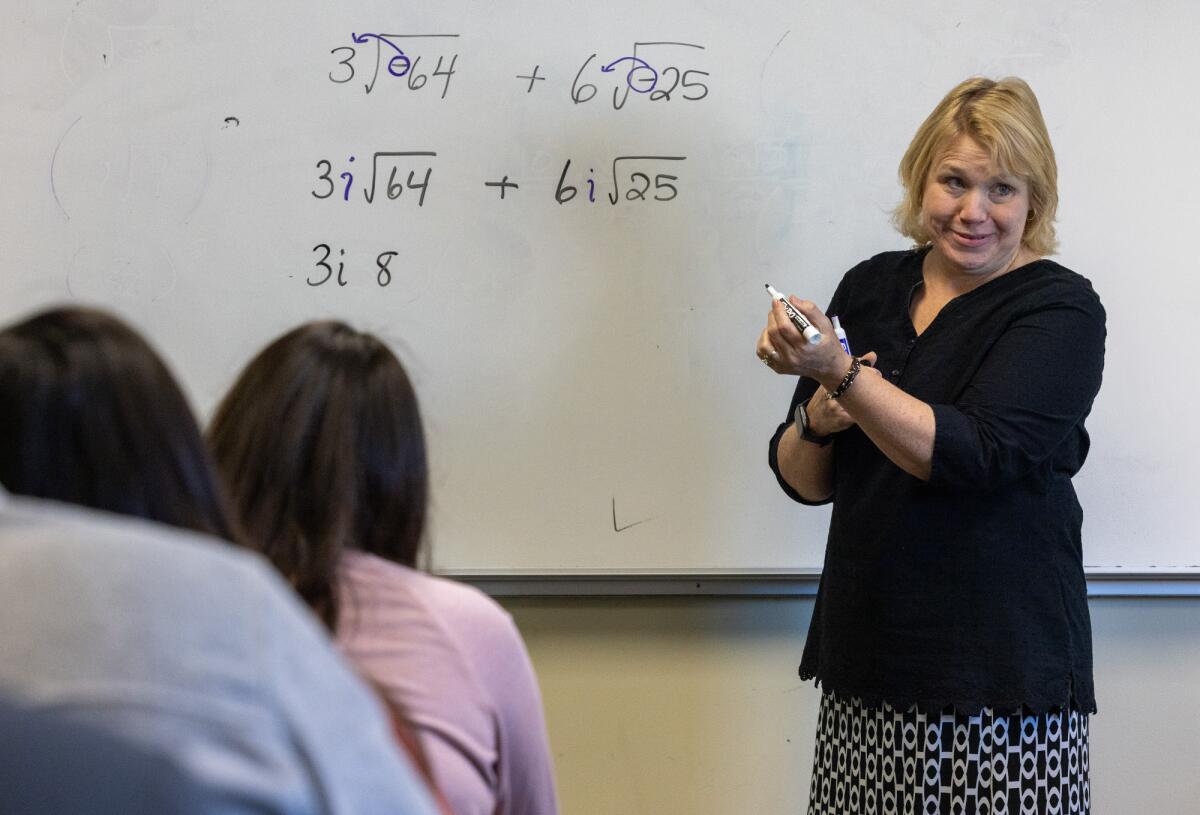Not every student needs algebra 2. UC should be flexible on math requirement
Editorials
The Times Editorial Board March 28, 2024
University of California faculty and administrators have been debating a change to required courses that sounds like a small issue, but that should have the academic sphere asking these questions about the goals of higher education: Should students be required to study just what they will need for the jobs they expect to have in the future or should they emerge as well-rounded graduates? And is rigor in school requirements more important than making courses relevant to young people?
At issue is whether high school students can apply to UC if they have taken a data science course in place of
a
lgebra 2, the traditional third year of high school math that used to be required of all applicants. Algebra 2 is more abstract than data science, a form of applied mathematics that combines math, statistics and other tools to provide a wide range of useful information for many professional careers. That could include predicting side effects to medication, consumer buying trends or matching couples on dating apps.
UC first approved a data science course offered by
the
Los Angeles Unified School District in 2013 as a substitute for
a
lgebra 2. Other school districts followed suit, adopting data science courses that are popular among students who find mathematical theory too difficult. The expansion to data science was seen as an equity move for Black and Latino students who have excellent academic records but were being kept from four-year colleges by
not having taken a
lgebra 2. It also was a requirement for California State University, which follows UC standards.
UC faculty found, though, that the three most popular data science courses in the state, including LAUSD’s, were too lacking in
a
lgebra 2 or other higher math skills to qualify as a third year of college-prep math. Last week, the Board of Regents agreed to go along with the faculty findings, which means these three data science courses no longer would qualify. (It appears a few data science courses taught at specific schools will continue to be allowed.)
But the reason UC professors have given for rejecting the courses is odd: Even though students might not be planning to enter STEM fields when they begin college, many of them change their minds later. Algebra 2 is a prerequisite for those studies.
UC could be more flexible about the requirement. Students find new interests in college, often in fields where they have little background and have to start at the beginning. How hard would it be to offer a summer or one-semester makeup course in
a
lgebra 2 to a student who wants to switch from humanities to STEM?
Its another matter if the true motivation for the change is that UC faculty don’t believe the data science courses are rigorous enough or teach the abstract reasoning skills that students must demonstrate in order to succeed in colleges with high expectations. UC isn’t being unreasonable in wanting this level of rigor. It’s obviously not that high a bar to jump, given that nearly all UC applicants last year had
a
lgebra 2, while fewer than 1% had taken data science instead. Meanwhile, 25% of applicants finish calculus before their senior year of high school.
Data science is a worthwhile course for future college students, as is statistics. In fact, last year, UC Berkeley opened a college of data science. But if the courses arent rigorous enough to replace
a
lgebra 2, they need to be improved or they could be taken as a fourth year of math in addition to, rather than instead of, the advanced algebra course. A statistics professor at UC Berkeley said it would take a major overhaul to bring the rejected data science courses up to snuff. This would be the ideal, though. These courses, with their application to real-life scenarios, make math more appealing to students. Theres nothing wrong with that. And their usefulness in future careers cant be denied.
At the same time, universities dont have to lower their standards in order to provide equitable access to higher education. Rather, K-12 schools have to put the same kind of intense effort on building students math skills, starting at the earliest grades, that they are currently putting into reading. Math is, in its own way, just another form of literacy, and one that will be increasingly important in a technology-driven world.





